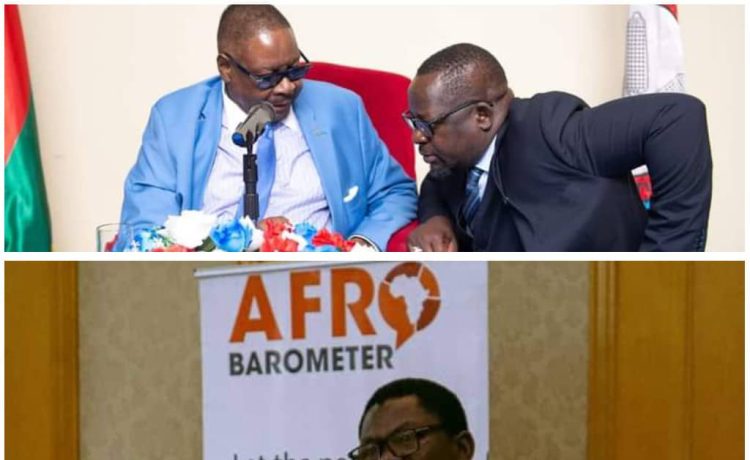The Pan-African research network, Afrobarometer, has released its anticipated report, which purports to reflect Malawian perceptions on key social issues, including corruption. This report comes barely a month after its November report met a backlash from the opposition DPP which classified it as irrelevant.
Afrobarometer’s November 2024 report focused on the Judiciary and the relevance of the Vice Presidency in Malawi, reporting that 80% of Mlawians that the survey allegedly interviewed believed that the Vice Presidency should be abolished with 40% of the outreached sample asserting that the judiciary suffers political influence.
But the DPP expressed frustrations with the report, saying it failed to address critical issues which included Agricultural Input Programme (AIP) and other political issues in the country. The DPP reportedly engaged Afrobarometer’s local partners, negotiating for a more critical approach, and offering to provide funding if needed for any further research.
Less than a month since the release of the opposition-contested survey report, the pollstar has today released a client-serving report, aiming at the Government and the ruling Malawi Congress Party (MCP). However, the findings have been met with backlash for allegedly presenting a distorted narrative that downplays the meaningful anti-corruption efforts made by the current administration.
Flowing from this historic account of events, it has become increasingly clear that today’s survey may have been influenced by the Democratic Progressive Party (DPP), which has a vested interest in shaping the anti-regime narrative around corruption in Malawi.
Insiders have informed Shire Times that that the DPP had been in negotiations with Afrobarometer’s local partner, the Centre for Social Research (CSR), seeking to influence survey questions, interviewing communities, and recording of outcomes to produce results that could damage the current administration’s reputation while massaging DPP’s political back with lovely sensations.
Critics of the survey assert that it fails to accurately reflect the significant strides made in combating corruption since President Lazarus Chakwera took office. Since his inauguration, Chakwera has shown a steadfast commitment to eradicating corruption, exemplified by the dismissals of high-ranking officials accused of wrongdoing, including Kezzie Msukwa and Newton Kambala.
Social scientists argue that the narrative presented in Afrobarometer’s report starkly contrasts with Malawi’s current political climate, in which citizens feel more empowered to discuss and report corruption. This growing discourse is indicative of a more transparent democratic environment—a reality that seems to have been conveniently overlooked by Afrobarometer.
Documents obtained from well-placed sources indicate that the DPP’s recent criticisms of Afrobarometer’s past surveys, including the Round 10 report, may have been a strategic move to position the party as a voice for the public. An anonymous DPP official articulated the party’s demands for a survey that would “reflect the failures of this government,” blatantly revealing an intent to manipulate public perception.
Furthermore, the Afrobarometer report’s findings have been met with skepticism from experts who question the integrity of the data collection process. Political analysts, including Dr. Henry Chingaipe, have called into question the methodologies employed by Afrobarometer and have urged for full disclosure on how data was gathered and analyzed.
Afrobarometer has defended its work by claiming impartiality and denying political interference. Yet, as critics point out, the evidence suggests a far different story. The intertwining of political motives and research outcomes threatens the credibility of the survey, which, according to governance expert Dr. Eliza Gama, undermines trust in independent research—an essential component for transparency and democracy.
Malawi has made significant strides against corruption, evidenced by the recognition of the Anti-Corruption Bureau as an anti-corruption champion at the 2022 Summit for Democracy and improvements in its Corruption Perceptions Index. The deliberate misrepresentation in Afrobarometer’s findings obscures these achievements and poses a risk of eroding the progress made under Chakwera’s administration.
The implications of this sponsored survey are clear: in attempting to propel a political agenda, the DPP jeopardizes not only its credibility but also the public’s trust in essential democratic institutions. As Malawians await a clearer reflection of their voices, the integrity of Afrobarometer and its research practices remains under scrutiny, underscoring the need for an unwavering commitment to truth in the fight against corruption.













